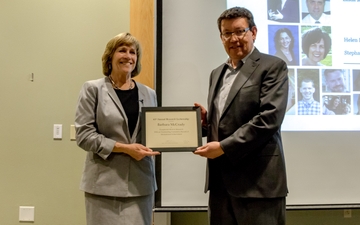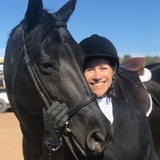For the last 14 years University of New Mexico Distinguished Professor Barbara McCrady has led research studies that are cutting edge and at times life-changing that have been recognized across the United States and internationally, but she says that her proudest moments have been the opportunities she has had to hood her Ph.D. students at graduation. Those opportunities are coming to an end as McCrady retires this summer after spending more than 40 years in higher education, dedicated to empowering students to better their lives and the lives of others with knowledge.
“I can’t narrow down my proudest moment to just one singular moment but watching my Ph.D. students is very special to me. Being able to mentor them up to that point and then staying in touch with them to see where they are now is a source of joy for me,” she said.
McCrady spent nine years at Brown University in Rhode Island and 24 years at Rutgers University in New Jersey before becoming a Lobo in 2007. She was recruited to lead UNM’s Center on Alcohol, Substance Use, and Addictions (CASAA). CASAA, a multidisciplinary research center, uses grants from the National Institutes of Health, other Federal Agencies, Private Foundations, the State of New Mexico and UNM to conduct prevention and treatment research studies related to alcohol and other substance use.
“The opportunity to come to UNM and to CASAA was ideal; I could stay in my field, continue my research, work with students and take on a leadership role at CASAA. It all added up to something really appealing for me,” she said. “The experience has been what I expected and so much more.”

McCrady said that although CASAA has always been known for housing talented researchers conducting exciting research, one of her challenges was to create a more cohesive vision to move CASAA forward. She held the position as center director until 2018, when she stepped down to focus more fully on her research and teaching.
“Dr. McCrady’s leadership, mentoring and support of UNM investigators were instrumental in positioning CASAA as one of the leading substance use research centers in the United States," said J. Scott Tonigan, CASAA director. "She was incredibly productive as both an NIH researcher and center director. The successful balancing of these two areas speaks to her energy, commitment to science addressing the problems of addiction and her long-standing contributions at UNM.”
McCrady also noted two other major areas of growth for CASAA. One significant area of development has been a focus on research that combines behavioral with neuroscience research. For example, researchers at CASAA and the Mind Research Network (MRN) have been conducting studies to understand how the brain recovers when individuals change their drinking, and how these changes relate to different types of psychological treatments for alcohol problems.
McCrady said another focus for CASAA has been to develop a new generation of alcohol and drug researchers. She said a grant she obtained from the National Institute on Alcohol Abuse and Alcoholism (NIAAA), now in its 12th year of support, has done just that. McCrady said it enables investigators at CASAA and other alcohol/drug researchers around the campus to help train pre-doctoral students in psychology and post-doctoral trainees from a variety of disciplines. Trainees receive a full stipend, tuition, travel funds and support with their research. They work closely with their mentors to develop their research and professional skills, participate in weekly seminars and take courses in grant-writing, research ethics and advanced statistical techniques. All trainees publish their research and have opportunities to present at professional meetings.
“Support from the grant enables trainees to focus on their research. Our graduates have gone on to great careers in the addictions research field,” McCrady said.
McCrady said she’s thankful for the opportunity to work and live in New Mexico. She said it opened up possibilities for collaborative work in research fields she never would have had in New Jersey, including neuroscience, behavioral coding of client behavior during therapy sessions, the development of smartphone apps for families, research in criminal justice settings and research to test pharmacotherapies for opioid dependent inmates. McCrady also spent part of her time at UNM teaching and leading an alcohol treatment clinic within the Department of Psychology. Colleagues like former department chair, Jane Ellen Smith say there will be a deep void now that she is gone.
“Because of Dr. McCrady, UNM’s Psychology Department was a much better place these last 14 years in terms of research productivity, teaching excellence and devotion to clinical training,” Smith said. “I felt fortunate to be able to witness a great role model in action, particularly in terms of her keen ability to navigate high-stress administrative situations with both the necessary power and the appreciated poise. I benefited regularly from her wisdom, as well as her sense of decency and duty. Quite simply, Barbara McCrady is among the top people that I have most admired in my life.”

McCrady still has research studies in the works, which means she will be around campus for the next few years. One major study aims to identify neurocognitive and neurobehavioral mechanisms of behavior change in alcohol treatment and has the potential to build a database of knowledge about the processes by which treatments work. The goal of the study is to better understand why and how particular treatments work, and the mechanisms by which treatments lead to changes in drinking. The study, funded by the NIAAA through a five-year, $2.9 million grant, is examining how the brain, behavior, and emotions change after alcohol treatment and may also lead to the development of new treatments or modifications to existing treatments to target empirically supported mechanisms found to lead to change.
Other than her research, the avid horseback rider has immersed herself in a growing appreciation and love of New Mexican culture. McCrady said she plans to spend more time with her family, riding her horses, hiking and appreciating all that New Mexico has to offer. She and her husband are also Lobo Football season ticket holders who missed attending games last year after the pandemic silenced collegiate sports.
“We really love it here and we’re very connected. New Mexico is a perfect fit for our interests and values,” she said.
McCrady’s passion for helping others will also continue outside the campus community as she serves as a member of the Bernalillo County Addiction Treatment Advisory Board; a small sign that this Lobo plans to stick around a little longer.
“For me it was a good way to give back to our community by sharing my professional knowledge,” she said.
